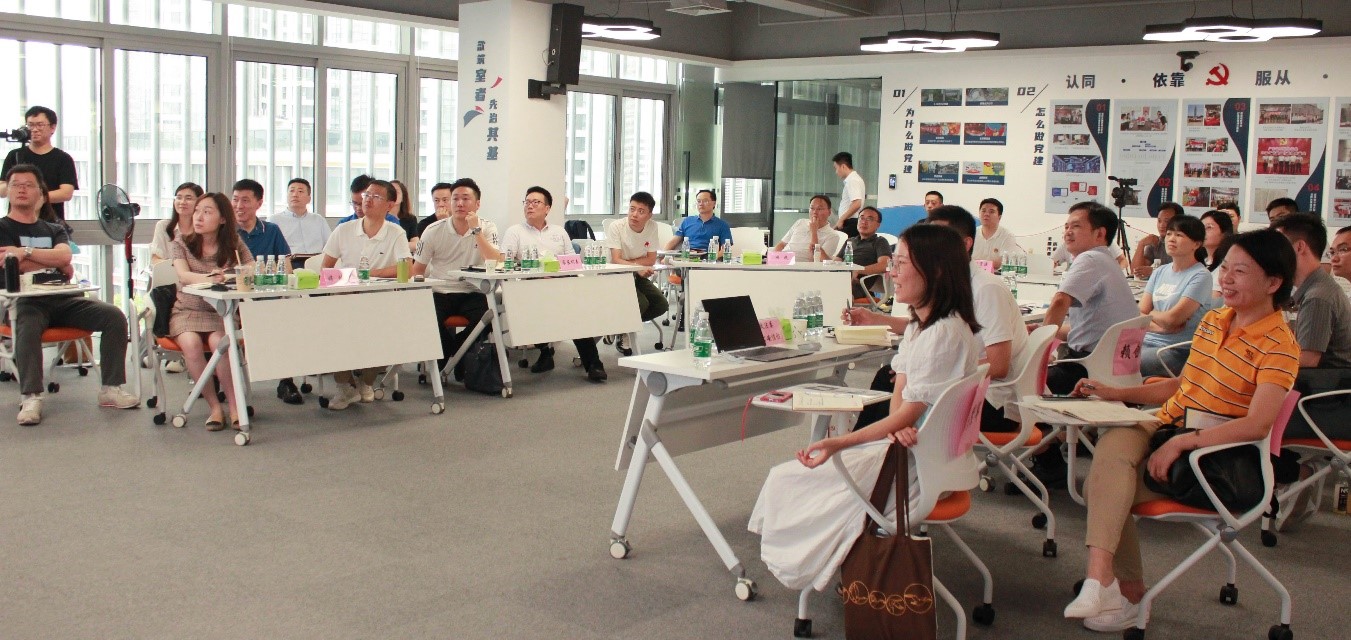Facing up to the Hallenges in Practices and Co-creating Learning Experience — the Academy Explores A New Model of Education and Teaching for the “Middle-aged and Young Cadres Classes”
Time:2021-08-06 15:26:36
Inone of the city’s alleys, an uncle has become an internet celebrity for his exquisite pancake-baking skills. When urban regeneration is being carried out in this alley, how should the governors of the city design a proper solution in the face of the uncle's shop and the demands of the citizens? After helping the uncle to upgrade his shop to a modern factory, how should we balance the administrative rationality and emotional experience in the face of the public's feelings and opinions about the "downgraded" taste of the mass-baked pancakes?
On July 31, the trainingclass for young and middle-aged cadres in Luohu District, organized by Shenzhen Reform and Opening Up Executive Leadership Academy, held a course on "Governance in Cases," in which more than ten practical cases were analyzed by the teaching experts to help the participants decipher the "structural conflicts in urban governance" and other issues concerning the grassroots governance in mega cities and help them to build a vivid picture of how digital transformation can help boost the effectiveness of grassroots governance.

Ifcase study is only about theory, the simulation training drew on the scenario-based teaching methods to have immersive experiences in actual practices so as to motivate trainees to learn actively and gain results. The training course took the simulated case of "school places controversy at Xihong Peiying Middle School" as the background, and embedded the occurrence, development and disposal process of the incident into the exercise (digital) system platform, in which the students were grouped to play seven roles including the education bureau, parent representatives, people from the media and netizens. Based on the group's pre-course research and expert classroom guidance, and with reference to the guidelines of the exercise system, the participants experienced the whole process of incident tracing, plan formulation, disposal implementation, press release and other practical aspects, analyzed their own shortcomings through the exercise, optimized their skill structure through sharing, and effectively improved their emergency response capabilities. Participants said that this "role-playing murder mystery game" style of teaching method made everyone very involved with a strong sense of relevance and participation.

General Secretary Xi Jinping pointed out that "improving the ability to solve practical problems is an urgent need to cope with the current complexcircumstances and accomplish difficult tasks, and it is also an inevitable requirement for the growth of young cadres." In order to deepen the innovation of cadre education and training mode and make the training more targeted and effective, the academy took the 2021 training course for young and middle-aged cadres in Luohu District as a pilot to explore the implementation of innovative cadre education and training programs that truly solve problems and address real issues.

Taking thestrengthening of political comprehension, political judgment and political execution as the position and focusing on enhancing planning, leadership and execution and other performance capabilities, the project applied action learning methodology, selected and assigned participating cadres to nine key special classes of tackling difficulties in the district. In the two-month trainings, the participants learned while practicing and made progress in practice.
In light of the learning needs of cadres in the front-line practice, the academy changed the one-way input-based training and teaching mode, proposed a tutorial plan consisting of Party history learning and education, introduction of central work issues, customized lectures by experts, application practice by students and results summary defense, and implemented it in "Wednesday night school" and "weekend lecture hall." It introduced teaching methods such as inverted classrooms, case study, sandbox exercise, simulation training and trainee forum to match and adapt teaching methods with teaching contents and objectives, and effectively shift the focus of teaching to Party education, thinking pattern expansion and practical thought inspiration.

The fact that theteaching process was co-created and the learning experience was shared is one of the distinctive features of the training course. First, the needs of the trainees and the learning process are taken into account as the basis and clues for designing the training program and formulating the tutorial plan and for analyzing and responding to the needs, so as to achieve the most accurate match between the design and the needs; second, teaching seminars were held to organize the participating cadres to interpret the learning objectives, invite the teaching experts to clarify the teaching plan, carry out two-way selection and make sure that the lecturers and students can reach consensus in terms of learning goals, contents and approaches; third, learning tasks were introduced ahead of the classes. The academy used the classroom to deepen the problem scenarios and promote the exchange of ideas, so as to help the trainees transform the new ideas and thoughts into practical strategies and administration suggestions, and promote the teaching process in the interaction between experts and trainees, and trainees and trainees; fourth, the academy built a shared community for learning. Through the team development activities, students deepened their understanding of cross-departmental partners in a cooperative game situation. Based on the theme of the course, the academy launched activities to all the cadres to book lessons, in order to meet the learning needs of cadres in the district while creating a platform and space for communication and exchange between the trainees and other cadres in class.

Promoting the "deep integration ofParty building work and the basic work" is the basic principle that must be adhered to achieve training innovation. To carry out Party history education, the training focused on learning and implementing the guidelines given by General Secretary Xi Jinping in his speeches delivered at the ceremony celebrating the 40th anniversary of the establishment of the Shenzhen Special Economic Zone (SEZ) and under the theme of "Great Struggle, Great Project, Great Cause and Great Dream," and fully used the Shenzhen Party History Museum, Shenzhen Local Chronicles Hall and the exhibition celebrating the 40th anniversary of the establishment of Shenzhen Special Economic Zone. As “The country is the people, and the people are the country,” so we must live up to the new expectations of the people with new performance for the benefit of the people to carry forward the great Party building spirit. This training was positioned in the new journey and new outlook to aim for strong ability and new contributions. In terms of comprehensive ability, special research and development of sandbox exercise course — "backbone managers' seven abilities class," to guide young and middle-aged cadres to grow and implement projects. In terms of vision expansion, we arranged an exchange trip to Huawei to learn the concepts and practices of Huawei in stimulating organizational vitality; in terms of practical strategies, we designed teaching modules on hot issues such as urban renewal and demolition, wisdom of grassroots governance, and public opinion response to emergencies; in terms of mindset, we introduced localized systemic thinking courses to meet the urgent needs of young and middle-aged cadres to enhance their project planning power; in terms of trends and opportunities, we introduced localized systemic thinking courses to meet the urgent need of young and middle-aged cadres to enhance their project planning ability; in terms of trends and opportunities, we designed a participatory teaching format such as forums to stimulate participants to discuss with experts about "Luohu strategies in the construction of Guangdong-Hong Kong-Macao Greater Bay Area and cooperation between Shenzhen and Hong Kong."
We should be led by theParty building, have a strong faith, shoulder the responsibilities and keep forward. The source of motivation for the continuous progress of cadres and cadre education is the loyalty and love for the Party and the people in their hearts and actions. We need to be selfless and meet the expectations of the people. The value of cadre education and training lies in the fundamental unity of the Party and the people, and in the cultivation of cadres who truly know and care about the people. With the philosophy of loyalty, responsibilities, vitality and innovation, Shenzhen Reform and Opening Up Executive Leadership Academy will continue to foster new opportunities and open up new situations in the education and teaching reform, in a bid to write more “Stories of the Spring.”



 WeChat
WeChat